If decided to start a blog by buying domain name from Best Domain Registrar then before it, you should have to know who owns a Domain Name after finding it for your blog. Domain name have become the digital real estate of the 21st century in the current digital age.
They are not simply Internet addresses; they are brands, businesses, and identities. Whether you are a curious Internet user or a business proprietor seeking to safeguard your online presence, it is valuable information to know who Owns a Domain Name.
Due to privacy concerns and the intricacy of domain registration, accessing this information is not always straightforward. In this exhaustive guide, we will examine the various techniques and tools that can be used to determine the identity of a domain name’s owner.
Table of Contents
Understanding Owns a Domain Name | Domain Ownership
It is essential that we have a solid understanding of the procedure for registering domain names as well as the terminology that is involved with this process before we go into the ways for finding out who owns a domain.

1. Domain Registrar
A business or organization that oversees the registration of domain names on the internet is known as a “domain registrar.” GoDaddy, Namecheap, and Google Domains are just a few of the many popular domain registrars. When you buy a domain name, you are effectively signing a lease with a domain registrar to use that name for a certain amount of time, often one year but frequently renewable.
2. Domain Registrant
The person or organisation that has the legal rights to use a particular domain name is called the registrant. This role is sometimes referred to as the domain owner. This is the individual or organisation whose identity you are attempting to determine.
3. Domain WHOIS Data
The WHOIS database is a collection of information about domain names that have been registered. It includes information such as the name of the person who owns the domain, their contact information, the dates that the domain was registered and when it will expire, and the domain registrar. In the past, the majority of this data was made public and was not difficult to get. However, because of concerns about individuals’ right to privacy, rules such as GDPR (General Data Protection Regulation) have limited public access to WHOIS data. This has made it more difficult to determine who the owners of a domain are.
Methods to Find Out Who Owns a Domain Name
Despite the fact that WHOIS data is subject to some privacy constraints, there are still a number of ways and resources at your disposal that may assist you in discovering the identity of a domain owner.
1. WHOIS Lookup
You may not have access to all of the WHOIS data, but if you run a WHOIS search, you can still find out some useful information about a domain name. There is a wide variety of software and websites available on the internet that provide WHOIS lookup services.
You may use them to access information such as the domain registrar, the registration date, and even the registrant’s name and email address if it has not been protected. If it has been protected, you will not be able to retrieve this information.
To perform a WHOIS lookup, follow these steps:

- Visit a WHOIS lookup website or use a command-line tool like ‘whois’ if you’re comfortable with it.
- Enter the domain name you want to investigate.
- Review the information that’s available. If the registrant’s information is protected, you may only see details about the domain registrar and registration date.
2. Registrar’s Website
Visiting the website of the domain registrar that administers the domain name in issue is yet another basic option that may be used. On their own websites, several registrars provide a WHOIS lookup facility for users. Because it has access to the registrar’s full records, this tool has the potential to reveal more information than the WHOIS databases that are freely accessible to the public.
Search for a Domain With Domain.com WHOIS Lookup Tool
One of the most widely used services for registering domain names is domain.com. It gives you the ability to register any top-level domain name extension (TLD) as well as dozens of the most popular country code top-level domains (ccTLDs).
They provide practically all of the features that you would anticipate from a leading domain name registrar, such as private registration, domain name administration, email accounts, simple transfers, and even web hosting.
The WHOIS lookup tool is one of the extremely helpful tools that they provide. This will do a search of the public WHOIS database for any domain name information that may be accessible.
To use this tool, go to the WHOIS lookup on Domain.com and input the domain name in the appropriate field.
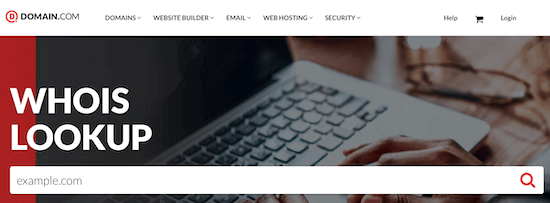
Then, the tool will display the available WHOIS results.
It will show you information like the domain name registrar, who owns the domain, when it was registered, and any available contact information.
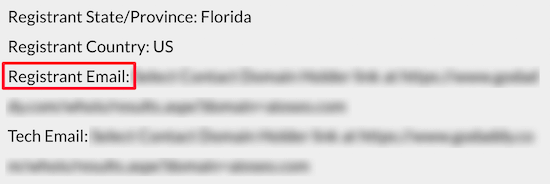
If the user’s preferred email address can be reached, it will be shown in the ‘Registrant Email’ section.
You may also attempt to get in touch with the person who owns the domain name by contacting the registrar for the domain. We go into more detail about it below.
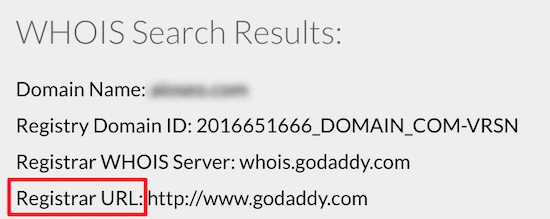
Search for a Domain With Network Solutions WHOIS & Domain Lookup
Over seven million domain names are registered under Network Solutions, making it one of the most significant registrars of domain names in the world. Using this service, you will be able to register a broad choice of the most popular domain name extensions.
They also provide you with practically everything else you need to establish your WordPress website for your small company, such as website hosting, security tools, search engine optimisation services, and more.
You may use the WHOIS lookup and the domain lookup tool to discover who the owner of a certain domain name is.
Simply look up the domain you wish to research, then click the “Search” button.
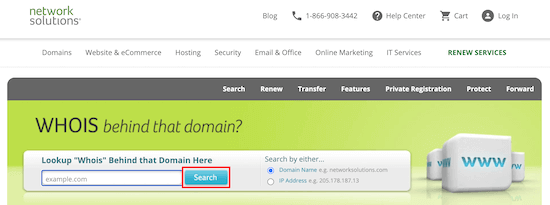
After then, the tool will provide any accessible information on domain registration.
If the domain in question is registered with Network Solutions, then and only then will the WHOIS information be shown in its entirety.
However, Network Solutions also offers a one-of-a-kind add-on service that will negotiate the purchase of the domain name on the customer’s behalf while maintaining their anonymity.
In the event that you want to make advantage of this service, all you need to do is click the “Backorder” button, make a down payment, and then their staff will start to work.
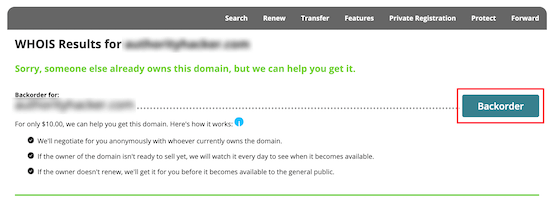
This can be a great way to purchase a domain name from an owner without doing all the work yourself.
Search for a Domain With GoDaddy WHOIS Domain Lookup
GoDaddy is one of the domain name registrars that has been in business the longest and is the biggest in the world. It now manages over 77 million domain names. They provide affordable prices in addition to a wide variety of domain name extensions for customers to choose and choose from.
You will utilise the WHOIS Database tool provided by GoDaddy in order to find out who the owner of a certain domain name is. It accomplishes a similar purpose to the technologies described above.
Simply input the domain name into the WHOIS database search, and the instrument will locate the pertinent information on the domain name.
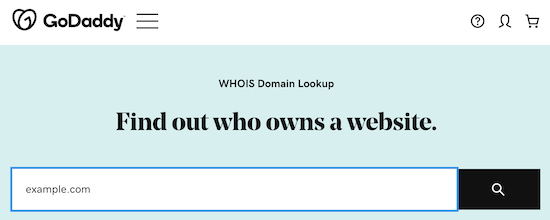
You might notice that their is similar process to find the results of domain lookup.
Here’s how to use a registrar’s WHOIS lookup tool with all domain registrar:
- Go to the website of the domain registrar.
- Look for a “WHOIS” or “Domain Lookup” tool. It’s usually in the domain management or domain search section.
- Enter the domain name and initiate the search.
3. Domain Ownership History Services
Domain ownership can change over time due to sales, transfers, or other reasons. To track the history of a domain’s ownership, you can use specialized services like DomainTools or Whoisology. These services maintain historical WHOIS data, allowing you to see past registrants and changes in ownership.
To use a domain ownership history service:
- Visit the website of the service provider (e.g., Whoisology).
- Enter the domain name you want to investigate.
- Browse through the ownership history to see if it provides any relevant information.

4. Online Domain Marketplaces
You may investigate well-known domain markets such as Sedo, Flippa, or GoDaddy Auctions if you have reason to believe that a domain name is now up for sale or has been traded in the recent past. On a regular basis, these sites provide the contact details of the broker or current owner of the domain.
Here’s how to use online domain marketplaces:
- Visit a domain marketplace website (e.g., Sedo).
- Enter the domain name in the search bar.
- Browse the listing for contact information or clues about the owner.
5. Use a Domain Research Service
There are several different web services that are dedicated to investigating domain ownership. They compile data from a variety of sources and may provide extra information on the history of a domain and who currently owns it. DomainIQ is one example of such a service.
To use a domain research service:
- Visit the website of the service (e.g., DomainIQ).
- Enter the domain name you want to investigate.
- Review the information provided, including past ownership records.
6. Contact the Domain Owner
When trying to determine who the owner of a domain name is, it may be easiest in certain circumstances to make direct contact with the owner of the domain. This might entail sending an email to the specified contact address or utilising a contact form on the website of the domain, if one is present there. When asking questions, always maintain a courteous and professional demeanour.
Challenges and Privacy Considerations
Although these techniques may be able to assist you in locating the owner of a domain, it is crucial that you be aware of the difficulties and privacy implications involved:
1. Privacy Protection Services
A great number of registrars of domain names provide customers with privacy protection services that hide the registrant’s personal information from view by third parties. In these kinds of situations, the only information you could see is the registrar’s contact information.
2. Legal and Ethical Considerations
Pay attention to the privacy preferences of the people who control domains, and make sure that any information you receive is used in a responsible and legal manner. Any use of this material without authorization might have serious legal repercussions.
3. Incomplete or Outdated Data
The WHOIS data may not always be correct or up to date. The contact information provided by domain owners may not always be up to date.
Conclusion
If you’re looking into a possible business partner, attempting to reclaim a lost domain, or just trying to maintain the credibility of your online brand, knowing how to identify the owner of a domain name is a skill that will come in handy in all of these situations.
Despite the fact that privacy restrictions have made it more difficult to get this information, there are still techniques and tools that may be used to discover who owns a domain.
Always keep in mind the importance of protecting people’s privacy and acting ethically and properly with the information you collect. In the event that you are concerned about domain ownership or conflicts, you may also consider seeking the advice of legal authorities.
Uncovering the digital identity hidden behind a domain name and successfully navigating the ever-changing terrain of online ownership and privacy are both possible if the appropriate strategy and tools are used.
FAQ on Find Out Who Actually Owns a Domain Name
What is domain ownership?
Domain ownership refers to the legal rights held by an individual or entity over a specific internet domain name.
Why is it important to know the owner of a domain name?
Knowing the owner of a domain name is essential for various reasons, including legal issues, domain acquisition, and online security.
How can I find out who owns a domain name?
You can find out domain ownership by performing a WHOIS lookup, visiting the registrar’s website, or using domain research services.
What is a WHOIS lookup?
A WHOIS lookup is a query to a database that provides information about a domain name, including the registrant’s details.
Is all WHOIS data publicly accessible?
No, due to privacy regulations, not all WHOIS data is publicly accessible. Some registrants opt for privacy protection services.
What information can I typically find in a WHOIS record?
A WHOIS record may contain details like the registrant’s name, contact information, registration date, and the domain registrar.
What if the WHOIS record is protected or incomplete?
If the WHOIS record is protected, you may only see the registrar’s information. Incomplete or outdated data can also be encountered.
Are there tools to perform WHOIS lookups online?
Yes, there are various online tools and websites that offer WHOIS lookup services.
Can I use a domain registrar’s website to find ownership information?
Yes, many domain registrars have their own WHOIS lookup tools on their websites.
What are domain ownership history services?
Domain ownership history services track changes in a domain’s ownership over time, providing historical data about past registrants.
How do online domain marketplaces help in finding domain owners?
Online domain marketplaces may display the contact information of the current domain owner or broker if the domain is for sale.
What is a domain research service, and how does it work?
A domain research service combines data from various sources to offer detailed information about a domain’s history and ownership.
Can I contact the domain owner directly?
Yes, in many cases, you can contact the domain owner by sending an email to the listed contact address or using a contact form on the domain’s website.
Are there privacy considerations when investigating domain ownership?
Yes, respecting the privacy of domain owners is crucial. Unauthorized use of information can have legal consequences.
What are privacy protection services for domain names?
Privacy protection services offered by registrars hide the registrant’s personal information from public view in the WHOIS database.
What should I do if I encounter outdated or incorrect WHOIS data?
If you encounter outdated or incorrect data, you can contact the domain registrar to request updates.
Can I use the information I find about a domain owner for legal purposes?
Yes, the information you find can be used for legal purposes, but it must be done ethically and within the boundaries of the law.
What if I suspect domain ownership disputes or issues?
If you suspect domain ownership disputes or issues, consider consulting legal professionals for guidance.
Are there limitations to finding domain ownership?
Yes, some limitations include privacy protections, incomplete data, and the registrant’s choice to remain anonymous.
How has GDPR impacted access to WHOIS data?
GDPR (General Data Protection Regulation) has restricted public access to WHOIS data to protect the privacy of domain registrants, making it more challenging to access certain details.
